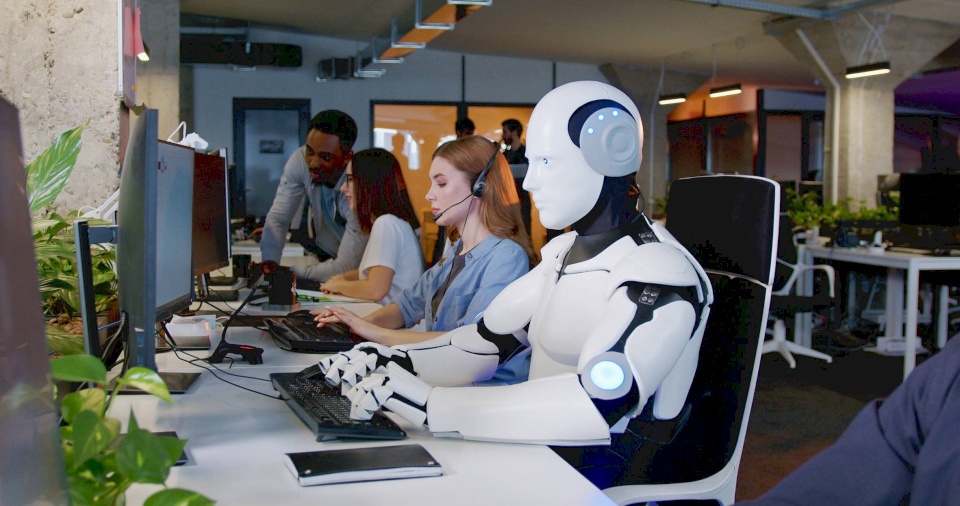
New Study: The "Millennial" Generation is the Most Dependent on AI Tools Daily
SadaNews - A recent study conducted by the "Slack" company, a subsidiary of "Salesforce," revealed that the "Millennial" generation (employees aged 28 to 43) is leading the charge in adopting this technology in daily work environments. The results indicate that one in three employees in this category uses AI tools daily, while nearly a quarter of them rely on them several times a week.
These figures do not merely reflect a fleeting enthusiasm for new technology; they confirm that the Millennial generation has become the driving force behind a profound cultural shift in how companies use technology, particularly concerning increased productivity, task automation, and expanding the responsibilities that employees assume.
The "Millennials" are advancing while "Gen Z" is catching up.
Despite the clear progress of the Millennial generation, members of "Gen Z" are not far behind, as they too are adopting AI at a significantly faster rate than their older peers from "Generation X" or the "Baby Boomer" generation (born between 1946 and 1964). However, the fundamental difference is that Generation Z tends to use these tools for educational or personal purposes, while Millennials benefit directly in their daily work.
Lucas Ponte, Vice President of Research at "Slack," explains that the younger generation is more inclined to seek personal and educational experiences, but has yet to reach the stage of regularly employing AI in work environments. In contrast, Millennials succeed in transforming these tools into tangible productivity powers for companies, making them a crucial bridge between technology and corporate goals.
The "Millennials" as informal training resources
The study reveals another dimension that may not be immediately apparent, which is that the Millennial generation may represent the most important source of internal training for companies in the next phase. With their significant experience in work environments and growing familiarity with AI capabilities, they can help accelerate the learning process for new employees from Generation Z, providing them with the insight necessary to use these tools cautiously and effectively.
Jeni Siemens, Global Head of Corporate Learning at "Salesforce," comments that one of the most important lessons that millennials can offer their younger colleagues is "good judgment." She explains, "New employees need to know when to trust what AI produces and when to be skeptical. This requires deep practical experience in the workplace, which millennials often possess more than others."
Balancing trust and oversight
One of the major challenges facing companies today is drawing clear boundaries for using AI. While these tools provide tremendous capabilities, inputting sensitive data into systems without controls can open the door to significant risks. Here, more experienced employees play a vital role, as they understand the nature of data that should be shared and the data that needs protection. They are capable of helping their new colleagues grasp the nuances of institutional policies and ensuring that responsible technology use enhances security and compliance, rather than exposing the company to uncalculated risks.
Relationships in the age of AI
The lessons from Millennials extend beyond the technical realm, reaching into relationship-building in complex work environments. Gema Quinn, Vice President of Global University Recruiting at "Salesforce," states that one of the key elements of success for new employees is the ability to collaborate, whether with human colleagues or AI agents that have become part of the modern work environment. She adds, "When new employees join large companies, the crucial first step is to build a network of relationships. These relationships enable them to gain a deeper understanding of the company culture and facilitate their use of new technological tools within a collaborative context."
Reassurances from the Millennial Generation
The Millennial generation has lived through the digital technology boom since its inception, giving them increasing confidence that AI will not displace new employees or limit their opportunities. On the contrary, Millennials affirm that this technology will open up new horizons for growth and learning. Quinn clarifies: "AI will not eliminate entry-level jobs; rather, it will develop them. Thanks to these tools, new employees can accomplish far more than was possible just a few years ago, significantly enhancing their chances for rapid career advancement."
The results of the study show that AI has already become an integral part of the workplace, but the success of organizations in leveraging its potential depends on more than just rapid technology adoption. It requires collaboration across generations, where Millennials lead the integration process and offer their expertise to younger generations, while Generation Z brings innovation and curiosity. This dynamic could shape an ideal model for mutual learning, where each generation benefits from the strengths of the other, fostering a more inclusive and sustainable technological culture in companies.
In the end, the "Slack" study confirms that the Millennial generation is not just a middle-aged demographic in the work cycle, but a key player in shaping the future of smart work. They not only embrace AI but redefine how it is integrated into work environments responsibly, productively, and humanely.

Birdwatching Tourism: Pleasure, Excitement, and Unexpected Scientific Discoveries

Dopamine Boosting and Attention Weakness: Beware of Digital Drugs Inside Your Phone

انطلقت منذ 20 عاماً.. ما لا تعرفه عن منصة "روبولوكس"

India Offers Tax Breaks Until 2047 to Attract Cloud Computing Giants

Do You Write To-Do Lists by Hand or on Your Phone? 9 Traits Distinguishing the First Group

Developments in the Health Condition of Actress Susan Badr

How Artificial Intelligence Steals Our Faces and Our Money?

